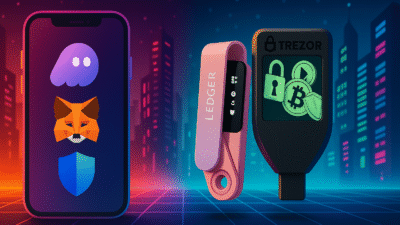Another day, another DeFi exploit – this time on Solana. On April 26, a Solana-based lending protocol called Loopscale suffered a $5.8 million hack, forcing it to halt operations and rattling confidence in the network’s DeFi ecosystemcointelegraph.com. The attacker pulled off a series of under-collateralized loans – essentially tricking the protocol into giving out more funds than it should have – draining about 5.7 million USDC and 1200 SOL in the processcointelegraph.com. That amounted to roughly 12% of Loopscale’s total value locked (TVL) getting siphoned in one gocointelegraph.com. Ouch. The incident underscores a harsh reality: no matter the blockchain, DeFi remains a high-risk Wild West, with hackers constantly a step ahead.
The Loopscale Exploit: What Happened
Loopscale, which launched only on April 10 after months of beta testing, touted an innovative approach to lending – using an order book model to match lenders and borrowers directly, and even allowing under-collateralized loans for things like receivables financingcointelegraph.com. Unfortunately, it appears this complexity opened a loophole. On April 26, a hacker executed a clever strategy of taking a series of under-collateralized loans across Loopscale’s USDC and SOL vaults, effectively siphoning out funds without putting up enough collateralcointelegraph.com. They made off with nearly $5.7M in USDC and 1,200 SOL (roughly $100k+ in SOL), according to the project’s co-founder Mary Gooneratnecointelegraph.com.
Loopscale’s team reacted by pausing all lending markets immediately to prevent further damagebinance.com. They did manage to re-enable some functions like loan repayments and top-ups later, trying to allow honest users to unwind positions and avoid additional falloutcointelegraph.com. But all other functions (like new loans or withdrawals) remain frozen as they investigate. Basically, the protocol is in lockdown mode as they try to plug the hole and perhaps negotiate recovery (though no word on funds being returned yet).
The hack was a blow to Solana’s DeFi credibility. 12% of the protocol’s TVL gone is significantcointelegraph.com, and trust in Loopscale is shattered for now. It had around $40M TVL before; that’s now severely dented. The team said they’re investigating and working to recover funds and “ensure users are protected”cointelegraph.com, but realistically, unless the hacker is caught or returns the money (sometimes they do for a bounty), those funds are likely gone.
DeFi’s Ongoing Security Problem
This exploit is part of a larger pattern. Q1 2025 saw over $1.6 billion stolen in crypto hackscointelegraph.com, according to PeckShield’s April report – a jaw-dropping figure. And get this: 90% of that was just from one incident, the $1.5B hack of Bybit by North Korea’s Lazarus Groupcointelegraph.com. Yes, a centralized exchange hack dominated the stats, but the remaining ~$100M still came from various DeFi exploits. We’re only in April and already multiple DeFi projects have been hit.
Solana’s had a mixed history with exploits. While a lot of the headline hacks were on Ethereum or BSC, Solana hasn’t been immune (e.g., the Wormhole bridge hack in 2022). Loopscale’s case shows that even new projects with seemingly robust testing can have fatal flaws. Under-collateralized lending is inherently tricky – essentially trusting code to handle unsecured loans requires airtight logic. Attackers comb through these protocols specifically looking for math or logic errors, and they found one.
This leads to a broader discussion in the community: Are these sophisticated DeFi products too dangerous to be on mainnet? Some say yes, that protocols should stick to over-collateralization or simpler models until the space matures in security. Others argue that without pushing boundaries, we won’t innovate – but those pushing boundaries need to incentivize white-hat hackers to find bugs first, via audits and bug bounties. Was Loopscale audited thoroughly? If it was, that audit missed something big. If it wasn’t, launching a complex product without deep audits is playing with fire – and users got burned.
Impact on Solana and Users
For Solana’s DeFi, this hack is a setback. Loopscale was a promising addition – an attempt to diversify DeFi offerings on Solana beyond just basic lending and DEXs. Now confidence in trying fancy new Solana protocols might be dampened. Users are likely to retreat to the more battle-tested platforms or even withdraw to self-custody until dust settles.
We saw Loopscale’s hack cause a stir: other Solana projects quickly reviewed any associations, and some users moved funds fearing a contagion (like if Loopscale had to dump collateral somewhere). Fortunately, it seems isolated. But it does contribute to the narrative that DeFi = high risk. As a result, some community members are calling for an industry-wide push on better security practices – like multiple independent audits, insurance funds, and maybe more formal verification of smart contracts.
The affected users of Loopscale are in limbo. Since 12% of TVL is gone, potentially some lenders won’t get all their money back unless recovery happens. If the remaining funds eventually get distributed pro-rata, depositors might eat a loss. Borrowers who hadn’t been hacked might actually end up okay if their debts get partially “forgiven” due to the loss (silver lining for them, not so for lenders). It’s messy.
Hacker Dynamics
Interestingly, these days we sometimes see hackers return funds, especially if it’s a white-hat or if they got less than expected and want a safe out. No word yet if this hacker is open to negotiation. The Lazarus-style attackers typically do not return anything – they funnel to mixers and that’s that. Given the method (undercollateralized loans) and target (a smaller Solana protocol), this might be more likely an independent hacker or small group rather than a nation-state actor. If they’re smart, they’ll know $5.8M is enough to retire comfortably; maybe they’ll return a portion for a bounty to de-risk themselves. Or they vanish with it all.
Solana’s speed and low fees make it great for DeFi UX, but also potentially easier for attackers to perform complex multi-step exploits quickly (that might be cost-prohibitive on Ethereum due to gas). This isn’t the first undercollateralized loan exploit; similar logic issues have hit other chains too. It raises the point: just because you can do something in DeFi doesn’t mean you should without extreme caution.
Community Resilience vs. Fatigue
The crypto community is, sadly, getting used to these headlines. There’s a mix of outrage (“another hack?! Secure your damn contracts!”) and fatigue (“yep, add it to the pile”). But Solana supporters are spinning it as a learning experience. Many pointed out that the protocol was new and experimental, so such setbacks, while painful, are part of growth. They recall Ethereum’s early days of DAO hacks and parity wallet bugs – which Ethereum survived and grew stronger from, in part by learning hard lessons.
A rebellious, optimistic take from some community members: “This is why we decentralize and open-source – so exploits are found and fixed, not hidden.” In other words, trad finance also has losses (fraud, insider misuse) but they’re behind closed doors. In crypto, everything’s out in the open – including our failures. That transparency, while harsh, could lead to more robust systems over time.
In practical response, we see calls for user vigilance (don’t throw life savings into unaudited new protocols, no matter the APY), for dev accountability (if you launch and screw up, own it and compensate if possible), and for insurance adoption (DeFi insurance is still niche, but events like this show its value if it had existed for depositors).
Bottom line: The $5.8M Solana Loopscale hackcointelegraph.com is a stark reminder that while we chase innovation and yield, security remains the Achilles’ heel of DeFi. It’s a blow to Solana’s DeFi scene and to user trust. Yet, the community presses on, with renewed calls to tighten code and maybe slow down a bit on the unchecked experimentation. As one crypto user lamented, “We wanted flying cars; instead we got flying getaway vehicles for hackers.” Dark humor aside, the hope is that each fiasco pushes developers to build safer and smarter. In the ever rebellious spirit of crypto, we’ll take the punches, improve, and keep going – but damn, it’s a costly education.
Solana DeFi Protocol Hacked for $5.8M – Security Woes Persist
The content, Solana DeFi Protocol Hacked for $5.8M – Security Woes Persist, published on Mugen:City is for informational and entertainment purposes only.
We do not offer financial advice, investment recommendations, or trading strategies.
Cryptocurrencies, NFTs, and related assets are highly volatile and risky — always DYOR (do your own research) and consult with a professional advisor before making any financial decisions.
Mugen:City, its writers, and affiliates are not responsible for any losses, damages, or financial consequences resulting from your actions.
You are fully responsible for your own moves in the degen world. Stay sharp, stay rebellious.





